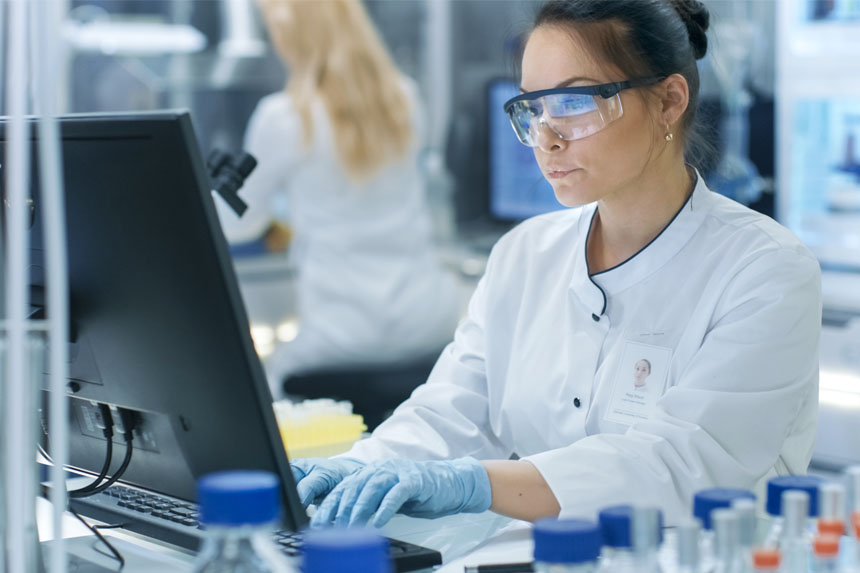Artificial intelligence (AI) and machine learning (ML) technologies are redefining the way biopharma companies discover and develop drugs.
It’s not a passing phase, either. Half of the 50 biggest pharmaceutical companies have entered into partnerships or licensing agreements with AI companies in recent years. It’s clear that pharma companies are embracing AI in droves, and if you’re in the life sciences industry, you should too.
The reasons why are simple: AI has the potential to revolutionize the drug discovery and development process, promising improved efficiency, accuracy, and speed. And according to Forbes, AI is slashing drug discovery costs for pharmaceutical companies by a whopping 70%.
But how exactly is AI being used to transform drug discovery, and why does it matter? Read on to find out!
How AI is used today
Without AI, discovering a new drug and identifying its potential use is a notoriously time-consuming and expensive process. It’s a long, challenging road to bring medicine to market, typically taking more than a decade and billions of dollars.
With AI, though, scientists can potentially make better drugs faster and improve the lives of millions of patients. Artificial intelligence can improve and accelerate nearly every stage of the drug discovery and development journey, including:
- Target identification. In this stage, AI is used to sort through and analyze large datasets in search of desirable molecules and their role in a disease. These datasets are massive, generally including genomics and proteomics data, clinical trials, animal research studies, patents, grants, publications, and more—which could take a human team several months to review.
- Virtual screening and optimization. Once potentially desirable molecules are identified, chemists work to determine which are most likely to bind to a drug target. AI can analyze tens of millions of compounds and use predictive modeling to find the needle in the haystack faster and more efficiently.
- Pre-clinical development. This step of drug development involves testing the safety and efficacy of the lead compound on animals. A typically expensive and time-consuming process, AI can help save time and money and reduce the number of animal studies needed by conducting virtual testing simulations. The team can then optimize and refine the lead compound with the help of machine learning algorithms that offer insights into the compound’s solubility, toxicity, and bioavailability, potentially reducing the number of compounds that need to be tested experimentally.
- Clinical trials. When a drug is ready to be tested on humans, AI can help design more effective clinical trials with a higher enrollment rate. Combining machine learning algorithms, natural language processing, and optical character recognition techniques can help quickly and accurately identify suitable candidates. One study found that using AI reduced patient screening time by 34% and increased overall enrollment by 11%.
This is by no means an exhaustive list of all the ways AI can improve the drug discovery and development process. Pharma companies can use AI to better prepare for FDA approval, size their total addressable market, scope out the major competitors, identify high-value prospects, and more. Check out our e-book for even more ways biopharma companies can leverage the power of AI to bring their treatments to market faster and create strategies grounded in healthcare commercial intelligence.
AI-discovered drugs are coming sooner than you think
Far from being a distant sci-fi future, biopharma companies have used AI to support drug discovery and development for years—and some of the treatments they’ve developed may be going on sale soon.
Perhaps one of the most notable milestones for AI-supported drug discovery is the molecule known as DSP-1181, which became the first ever AI-discovered drug to enter human clinical trials. An AI system found the molecule in early 2020 to be a promising candidate for OCD treatment. Machine learning algorithms were used to make billions of decisions and sift through thousands of potential compounds in search of the most viable molecule. DSP-1181's discovery showed the world that what normally takes a team of humans several years to accomplish can take a computer system one year.
More than three years later, innovation in the field has led to massive leaps, like the FDA classifying Insilico Medicine’s pulmonary fibrosis treatment as an orphan drug and the first novel antibody created by generative AI.
Today, there are more than 150 small-molecule drugs in the discovery phase that were identified using an AI approach, and more than 15 drugs are already in clinical trials, according to the Boston Consulting Group.
These major milestones paint a picture of just how rapid AI-assisted drug discovery can be. And the many ways AI can be applied to improve the process can lead to safer, more effective drugs with fewer side effects.
The excitement for AI-powered drug discovery extends beyond just biopharma companies and scientists. Investors are taking note of the momentum as well, with Morgan Stanley speculating that the improvements AI brings to early-stage drug development could result in an additional 50 novel therapies over 10 years. This represents a $50 billion opportunity—and indicates that biopharma companies can help more patients while generating new revenue.
It’s a growing industry, so what are you waiting for?
The AI train has left the station, and biopharma companies need to climb aboard if they want to have a leg up on the competition. For more on the most important AI-related trends in the life sciences industry, read our latest Intelligence Report.
AI is impacting more than just life sciences; it’s redefining how healthcare providers operate. Read our blog to see the surprising ways AI can improve a provider’s daily work.
If you’re a biopharma company curious about how AI can help improve every step of the commercialization process, we’d love to show you how our healthcare commercial intelligence platform works. Sign up for a free trial today to discover how AI-driven insights can solve your biggest challenges and help you grow.





